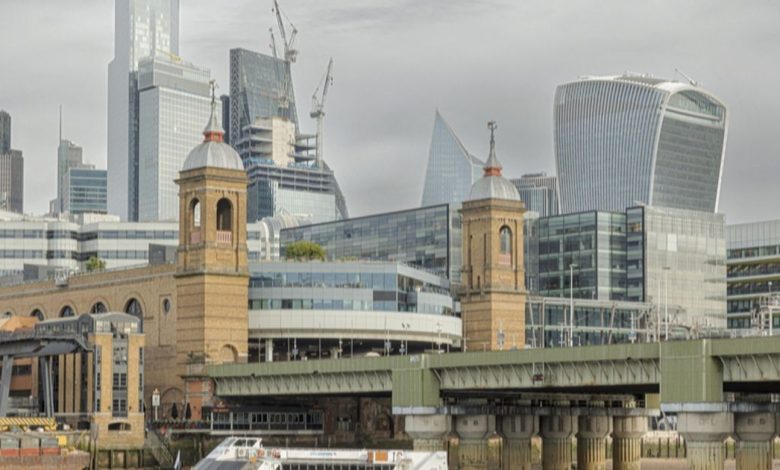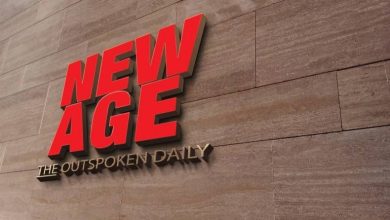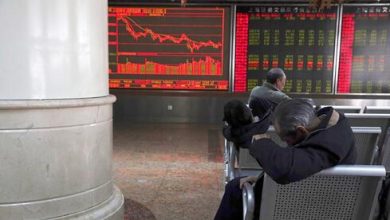London stocks in late slide, defence sector drags, Lloyds thrown Curve ball

- FTSE 100 falls 44 points at 9,507
- Inflation eased back to 3.6% in October
- Increased hopes of Bank of England rate cut next month
- Lloyds agrees to buy Curve digital wallet provider
4.52pm: FTSE flops
It was yet another losing day for the FTSE 100, down 44 points at 9,507. But signs of recovery were seen in stock markets today although Nvidia’s earnings still lie ahead, according to IG chief market analyst Chris Beauchamp.
“Given the amount of doom-laden coverage around the drop in stocks over the past week or more, you’d think we were witnessing a rerun of April’s tariff-related panic,” Beauchamp said.
“In truth indices around the globe had been overdue some kind of selloff, just to reset sentiment and allow some judicious profit-taking. It feels like many expect this to turn into the long-awaited selloff that pops the AI bubble, but such predictions feel far-fetched.”
4.14pm: FTSE in late slide
The FTSE 100 is losing its grip and sinking lower as the closing bell nears.
Defence companies are leading the decline, with BAE Systems and Babcock International down 4.6% and 3.2%.
Could this be linked to the reports that the UK government has offered 1% of Brussels €6.7 billion demand to join the EU defence fund, ie just €75 million, according to a FT report, and presumably been given short shrift.
Gilt yields are rising, so that is affecting some shares that are sensitive to such factors, like utilities, insurers and building and property companies. Big banks and oil companies are also a drag.
Meanwhile, in New York, the Dow Jones has dropped into the red, while the Nasdaq and S&P remain higher.
3.21pm: Ocado silver linings playbook
Ocado Group shares sank to their lowest since early 2013 this morning, following lows yesterday’s announcement from Kroker that it would be shutting three of eight Ocado warehouses.
But the shares are up 3% now, possibly following some optimistic analyst thoughts and bargain hunting.
The news was “not as bad as it could have been“, says analyst James Lockyer at Peel Hunt.
He feels the news “was always a possibility, but not the worst one”, said there “are silver linings in many places”, particularly that Kroger was not ending its partnership with the UK company.
Giles Thorne at Jefferies agreed that the news could have been worse and may in fact be “welcome” as it reveals the impact of Kroger’s previously signalled intention to review its e-commerce operations.
Equally, he raised the downside aspects to the news, alongside the downgrade to current and future year expectations: “the market must now consider the Kroger CFC’s that were committed but not yet under construction, but more fundamentally, the contagion Kroger’s actions creates.
2.52pm: US stocks open higher
Wall Street has opened broadly higher, led by tech stocks, reversing a four-day decline.
The Nasdaq Composite is up 0.8%, powered by strength in chip stocks and other tech, with Constellation Energy up 3.8%, Applovin rising 3.5%, Alphabet climbing 3.3% and Nvidia up 1.8%.
The S&P 500 has gained 0.48% and the Dow Jones is just above flat, while the Russell 2000 index of small-caps is also in positive territory, up 0.3%.
More positive sentiment is also apparent in London too, with losses pared.
1.48pm: Bank tax?
Another Budget tax measure could be a bank tax.
The Telegraph reported that the government is considering an increase in the 3% surcharge on bank profits above £100 million, UBS has been running the numbers.
Analyst Jason Napier at the Swiss bank estimates that a 2% increase could raise an additional £0.6 billion in 2026 from banks under its coverage, which includes Lloyds, NatWest and Barclays.
He said that such measures are a cost of equity issue, “though not a long-term EPS one”.
“While the government has previously professed support for UK financial services, the potential for bank taxes should not be discounted,” the analyst said in a note, adding that such developments reflect concerns about policy stability.
12.54pm: Budget in a week
The Budget is coming in a week’s time.
It’s being called the ‘hokey cokey Budget’ by the team at law firm Payne Hicks Beach, after the sheer volume of kite-flying new ideas and leaks for potential measures being reported on almost a weekly basis, with a number of seeming U-turns already.
“There has probably never been a budget that has been trailed so much in advance but about what will actually be announced so little is known,” says partner Basil Dixon.
“From what we have heard, it looks like income tax rates will not be going up, but other than that what will happen really is anyone’s guess,” he says, albeit adding that the introduction of a wealth tax now seems unlikely.
“We do know though that the chancellor needs more money (lots of it) so it seems inevitable that taxes will be raised.”
Potential tax changes include:
- Changes to the IHT gifting regime (will the 7-year PET regime be extended or even abolished?)
- Changes to the IHT regime for trusts
- Increases to the rate of CGT
- Limitations to the Main Residence Relief for CGT
- Changes to the tax-free CGT uplift available on death
- Changes to the pension rules
- Introduction of a Mansion Tax in one form or another
- Income Tax bands being frozen or even lowered
- Introduction of an ‘Exit Tax’ for individuals who emigrate from the UK
“After half a year of trailing, U-turns and intense speculation there is now under a week to go and whatever is announced on 26 November, we will at last know where we stand, and that’s what it’s all about,” Dixon zings.
Tom Selby, director of public policy at AJ Bell, notes that Rachel Reeves faces a difficult fiscal backdrop, with anaemic economic growth and persistently high borrowing costs requiring an estimated £20 billion of extra revenue to make her sums add up.
“Like a tightrope walker without a harness, there is danger wherever the chancellor turns.
“If she attempts to appease increasingly mutinous Labour backbenchers by sticking to the manifesto and not raising income tax, National Insurance or VAT, the revenues from the measures she brings forward will be less certain and the bond vigilantes could take flight. Which could, in turn, mean the chancellor is forced into a third painful Budget in 12 months’ time.
“If, on the other hand, she breaches the manifesto in a bid to stabilise the public finances, her political opponents will have a field day and Labour’s chances of re-election in 2029 could take a terminal hit.
“In short: whatever path Reeves chooses, this is set up to be one of the most consequential Budgets in modern times. For the chancellor and the prime minister, it feels like make or break time. For taxpayers, there is little doubt that this is going to hurt – the only question is how much?”
12.19pm: European markets mixed, US stocks set for rebound
The London index is back in the red just after midday, with European stock markets mixed, with the Paris benchmark also slightly in the red, but with small gains in Frankfurt and Madrid.
US futures are positive, though down a little from earlier.
Nasdaq and S&P 500 futures are up around 0.3%, while those for the Dow Jones are up less than 0.1%.
This follows a fourth successive day of falls yesterday, with tech stocks leading the sell-off, with the Nasdaq falling 1.2%, the Dow dropping 1.1% and the S&P 0.8%, while the Russell 2000 bucked the trend and rose 0.3%.
There were a couple of interesting things, says market analyst Kenny Polcari at Slatestone Wealth.
The Dow Transports index and the Equal Weight S&P 500 both ended flat, while the Mag 7 gave up 1.75%.
“This is interesting because I think the Equal Weight, and maybe even the Russell and the Transports, are telling us a new story,” says Polcari.
The Russell 2000 finished higher after falling 8.5% off its recent high, the Transports ended flat after getting slammed 4.5%, while the main S&P 500, Nasdaq and Mag 7 all got whacked again.
As the Equal Weight S&P index essentially strips out the giants, with every stock getting the same influence from Apple to a mid-cap industrial, when it holds firm at the same time that the S&P and Nasdaq get hit, it means the selling is concentrated in Big Tech – not the rest of the market.
“It means investors are quietly stepping in below the surface – buying the other 493 names: the value names, the beaten-up names, the under-owned names. That’s called rotation – and that’s also called opportunity. It tells you investors recognize that Tech is tired and it’s time to go shopping elsewhere.
“So, while the headline indexes look ugly, the Equal Weight is acting like a horse whisperer ,” Polcari says, also noting that Warren ‘Be fearful when others are greedy, and greedy when others are fearful’ Buffett sold a load of stock recently.
11.53am: Lloyds Curve deal thrown a curve ball
Following the agreed acquisition of Curve by Lloyds, the largest external investor in the London startup, has expressed concerns due to disputed governance and ownership details.
IDC Ventures, which owns a 12% stake, says it is “deeply concerned about the conduct of Curve’s management and board during the current sale process”.
IDC said it is reserving all legal rights pending further developments, alleging that a small group of directors and investors, including Curve’s CEO Shachar Bialick and several board members, “facilitated corporate decision-making to entrench control and override shareholder rights”.
“It is a matter of real surprise to shareholders that Lloyds Banking Group, a leading UK institution, would contemplate proceeding with a transaction that IDC believes is not in the best interests of the company or its shareholders. As such, IDC does not intend to support the proposed sale and does not believe that it is capable of being implemented without its support.”
IDC said it will “take all necessary steps to protect shareholder interests if those obligations are ignored”.
11.09am: AIM IPO for Radiohead manager
A potential new arrival on AIM for next month is All Things Considered Group, the manager of Radiohead, Nick Cave and PJ Harvey, which is raising £8.6 million as part of an LSE listing as it targets the next phase of growth.
If the fundraising gets approved by shareholders at a general meeting on 8 December 2025, admission to AIM is expected around 17 December.
Net proceeds will be used to strengthen working capital and support ATC’s strategy, including the hiring of new managers and agents, investment in technology for direct-to-fan services, and expansion of merchandise and service operations.
Chief executive Adam Driscoll said: “The group’s integrated model, developed through acquisitions and partnerships, has been purpose-built for the new data-driven era of music.
“ATC is now well positioned to harness and activate its artists’ fan data and unlock opportunities as part of the next trajectory of growth in the industry.”
10.46am: Hilton, Booking.com and Travelodge mislead over prices
Adverts from Hilton, Travelodge and Accor hotels and from Booking.com have been banned for the way they mislead over prices for rooms.
The Advertising Standards Authority upheld complaints against the four companies over the way they advertised hotel room prices “from” low prices that the watchdog found only applied to a small number of rooms.
The promoted price therefore overstated the value available, a probe found, which was felt to be unfair on potential customers looking for good deals or seeking to make an informed choice about where to book.
“Advertised prices must match what’s really available,” said ASA operations manager Emily Henwood. “If only a few rooms are actually offered at the price shown, or it only applies to a specific date, then this information must be made clear to avoid misleading people.
“People should be able to trust the prices they see in ads and these rulings show that we will take action if the rules are broken.”
AI was used to identify misleading adverts as part of a wider probe into the advertised hotel prices.
10.10am: FTSE turns positive
The FTSE has broken out of its early slump, and is looking slightly more positive, if not much more lively.
Germany’s DAX and some other mainland European markets are also in green.
“Investors will breathe a sigh of relief that the market sell-off has lost momentum,” says Russ Mould, investment director at AJ Bell.
With US futures prices imply a similar trend when Wall Street opens later today, he says this is “the good news everyone wanted”.
“The key question is whether this is simply the calm before the storm,” referring to Nvidia earnings after the New York closing bell tonight.
“The slightest bit of news to disappoint investors has the potential to whip up a tornado across global markets. Investors will be hanging on Jensen Huang’s every word and looking for clues that big investment in AI is worth it.
“Huang is an eternal optimist and Nvidia has a habit of smashing earnings expectations. Therefore, investors might be digging deeper than usual into the numbers to spot any signs of weakness, rather than simply being swayed by the headline narrative.”
Elsewhere, the gold price has perked up, risingf 1% to $4,111 an ounce.
This suggests that “investors are still hedging their bets and adding safe-haven elements to their portfolios just in case there is bad news around the corner,” says Mould.
This is behind the gains for miners Fresnillo and Endeavour, while positive moves for consumer staples and tobacco “suggests investors are loading up on defensives as protective measures against any further market weakness”.
Further dopwn the markets, recent IPO Beauty Tech Group PLC (LSE:TBTG) is up 9% after saying it would beat market expectations.
“That’s positive not just for the company but also the reputation of the UK market. Several other names to have floated recently in London have yet to capture the market’s interest, so Beauty Tech serving up good news offers a reason to stay positive on new listings.”
9.35am: Official house prices
House price inflation slowed in September, according to official house price index from the ONS, rising by 2.6% year-over-year, down from a 3.1% gain in August.
Growth in August was revised up from 3.0% previously. In seasonally adjusted terms, prices fell by 0.2% month-to-month in September, down from a 0.2% gain in August.
ONS head of housing market indices Aimee North said: “The Yorkshire and the Humber was the English region with the highest house price inflation while the regions with the lowest annual inflation are in the south of England.
“London is the only region showing an annual fall again.
“The rental market continues to cool, with UK annual inflation easing for the tenth consecutive month.”
8.43am: Christmas interest rate cut almost nailed on now
Here are some various thoughts on inflation and the Bank of England implications, but in short, a cut next month from the Monetary Policy Committee seems almost certain now.
Matt Swannell of the EY ITEM Club says: “Inflation has now passed its peak. Headline inflation is expected to remain at similar levels over the final months of this year before drifting downwards through next year.”
He points out that the minutes of November’s MPC meeting suggested tighter fiscal policy and further progress on inflation before the December decision would be key to whether there will be a majority in favour of a rate cut.
“Today’s data fulfils one of those criteria and keeps the MPC on track to deliver a 25bps rate cut next month,” he says.
Rob Wood at Pantheon Macroeconomics: “There are few certainties in life and we still have another round of labour market and inflation data before the MPC’s December meeting, but today’s CPI inflation release leaves a rate cut next month nailed-on.”
He notes that headline CPI slowed a little less than the MPC and the market expected, due to stronger food prices.
“But services inflation slowed more than the MPC expected, and underlying services inflation seems to be easing.
“There is enough here for the MPC to cut in December, but also enough to point to a lengthy delay until another cut with erratic factors helping the services slowdown. Accommodation services look ripe for a rebound. Rents, which the MPC look through, also slowed more than expected.”
Sanjay Raja at Deutsche Bank: “The MPC now has a clearer path for a Christmas rate cut.
“With the labour market softening more than expected, GDP growth weaker than the BoE projected, and (underlying) inflation tracking a little lower than BoE expectations, we think Governor Bailey – who will likely have the deciding vote for December – will feel more confident about cutting Bank Rate below 4%.”
8.15am: FTSE searching for direction at open
The FTSE 100 is searching for direction in early trades, up seven points and now down 11.
Fallers are led by Ashtead Group, United Utilities, Standard Chartered, Auto Trader, Rolls-Royce and Babcock.
Precious metals miners Endeavour and Fresnillo are topping the risers, both up over 2%, ahead of the likes of Metlen Energy, ICG, Shell, Sage and BAT.
Lloyds is down 0.8% after announcing its Curve deal (see below), but shares in other lenders are also in the red.
7.56am: WH Smith CEO steps down after accounting review
WH Smith PLC (LSE:SMWH) chief executive Carl Cowling has offered his resignation following a Deloitte review that found that supplier income had been overstated in North America, breaching the group’s accounting policies.
The review was called after a profit warning in August that found profits for its current financial year will be £30 million lower than current market expectations.
Deloitte found that it was mostly an issue about the “timing rather than existence” of income in how accounting standards were applied.
Cowling has stepped down as a director with immediate effect, but will remain employed by the company until the end of February to ensure an orderly handover, when a successor is found.
7.31am: Lloyds tries to get ahead with the Curve
Lloyds Banking Group PLC (LSE:LLOY) has announced an acquisition that should help it dial up its mobile banking game, with the acquisition of Curve, a London-based fintech that provides an all-in-one digital wallet, for an undisclosed price.
Curve’s platform allows users to integrate various bank cards, loyalty cards and alternative payment methods into one secure app, while also offering features such as money-saving tools and loyalty rewards.
Lloyds said the deal is not expected to materially impact its financials or full-year guidance for 2025 or 2026.
It plans to integrate the Curve Pay app into its mobile banking services to offer customers more flexible and personalised payment options, with “advanced digital wallet features” including switching past purchases across accounts, earning rewards on top of existing card benefits, accessing Pay Later solutions, and avoiding foreign exchange fees from any card linked to the app.
7.20am: Falling energy and hotel room prices
Alongside the inflation figures from the Office for National Statistics, the body’s chief economist, Grant Fitzner, says: “Inflation eased in October, driven mainly by gas and electricity prices, which increased less than this time last year following changes in the Ofgem energy price cap. The costs of hotels was also a downward driver, with prices falling this month. ”
He says these effects were partially offset by rising food prices, following a dip seen in September.
“The annual cost of raw materials for businesses continued to increase, while factory gate prices also rose.”
7.13am: FTSE 100 called higher as UK inflation eases
The FTSE 100 is expected to recoup a small portion of the previous day’s losses on Wednesday, as new figures were published showing UK inflation eased back last month.
Consumer price inflation in October was up 3.6% versus a year ago, down from 3.8% the month before, with a 0.4% month-on-month increase. The core consumer price index, which excludes fuel and food prices, rose 3.4% on an annual basis, down from 3.5%, while services CPI also eased to 4.5% from 4.7%.
London’s blue-chip index has been called 20 points higher on the futures market, having plunged 123 points or 1.3% yesterday to close at 9,552.3.
It was the fourth day of retreat for global markets, with Wall Street joining in the sell-off, led by tech stocks. The Nasdaq dropped 1.2%, the Dow Jones fell 1.1% and the S&P 500 declined 0.8%.
Asian markets are mixed this morning, with Japan’s, Korea’s and Hong Kong’s benchmarks slightly in the red, while mainland China’s and India’s are among those inching higher.





